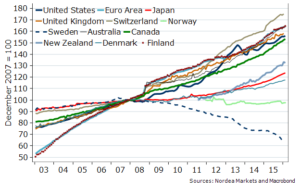On his blog, J P Koning discusses Kenneth Rogoff’s proposal to abolish high denomination notes (discussed earlier). Koning concludes: I agree with Rogoff’s general point that it makes sense to burden cash users with ever more work since this burden disproportionately falls on heavy users like criminals. But Rogoff hasn’t yet convinced me that the status quo policy of gradually increasing the workload involved in cash usage (via inflation) needs to be sped up by a sudden removal of every bill above the . After all, the Swedes are setting an example of how a policy of gradualism can be twinned with tax policy in order to get some of the very effects that Rogoff advocates, namely pulling people out of the underground economy into the legal economy. Koning refers to Martin Enlund’s post on the Nordea blog; Enlund suggests that decreased cash demand in Sweden may partly be due to policy reforms that rendered tax evasion less attractive.
Topics:
Dirk Niepelt considers the following as important: Cash, Money demand, Notes, Reform, Sweden, Tax evasion
This could be interesting, too:
Dirk Niepelt writes Does the US Administration Prohibit the Use of Reserves?
Dirk Niepelt writes “Report by the Parliamentary Investigation Committee on the Conduct of the Authorities in the Context of the Emergency Takeover of Credit Suisse”
Dirk Niepelt writes “Governments are bigger than ever. They are also more useless”
Dirk Niepelt writes The New Keynesian Model and Reality
On his blog, J P Koning discusses Kenneth Rogoff’s proposal to abolish high denomination notes (discussed earlier). Koning concludes:
I agree with Rogoff’s general point that it makes sense to burden cash users with ever more work since this burden disproportionately falls on heavy users like criminals. But Rogoff hasn’t yet convinced me that the status quo policy of gradually increasing the workload involved in cash usage (via inflation) needs to be sped up by a sudden removal of every bill above the $10. After all, the Swedes are setting an example of how a policy of gradualism can be twinned with tax policy in order to get some of the very effects that Rogoff advocates, namely pulling people out of the underground economy into the legal economy.
Koning refers to Martin Enlund’s post on the Nordea blog; Enlund suggests that decreased cash demand in Sweden may partly be due to policy reforms that rendered tax evasion less attractive.
Figure from Enlund blog:

